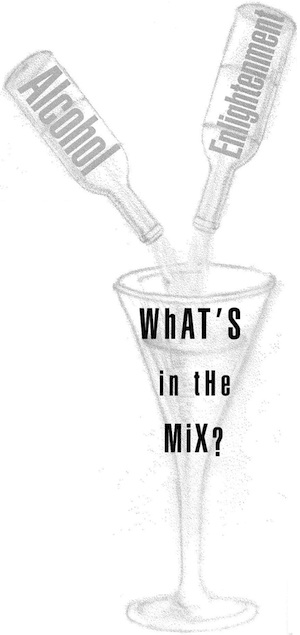 Do enlightenment and alcohol mix?
Do enlightenment and alcohol mix?
Bodhin Kjolhede: No. That’s the short answer. But let’s define our terms. There are many people who might consider themselves “drunks” who haven’t touched alcohol in years. But here I take the definition of “a drunk” to be based on behavior, current behavior—someone who consistently drinks to excess. And when you say “enlightened” I take that to mean someone who’s fully enlightened. Not just an awakening experience or two, but someone with the goods. Excessive drinking reveals a craving that would not be there if one were fully realized. Enlightenment is about freedom—not freedom to play out one’s cravings, but freedom from one’s cravings. If one would uproot the dualistic sense of self and other, then he or she would not feel the compulsion to drink to excess. That person would feel complete without needing a substance that is potentially destructive. Excessive drinking is destructive.
I don’t buy that Buddhist drunks are ever fully enlightened. It comes down to conduct. We live in a world of form and convention, and in the phenomenal world, our actions have the capacity to create beneficial or harmful effects. An allegedly enlightened person must manifest enlightened behavior. That’s where the rubber meets the road. A Buddhist drunk cannot be fully realized. But there are different degrees of enlightenment. We Westerners tend to think in terms of black and white; the gray areas are hard for us. There have been outstanding teachers in this country and in Asia who have had drinking problems. Some of them helped a lot of people and did a great deal of good (as well as harm). Their drinking doesn’t disqualify them or lessen their degree of enlightenment. But that enlightenment could not have been complete. Their drinking testifies to the staying power of human afflictions even after awakening. Our defilements just don’t quit.
Zen texts are full of statements by Chinese masters who warn of the force of habit-energies that continue after any enlightenment that falls short of Buddhahood. They were speaking out of their own experience, no doubt about it. Even they recognized that they had more work ahead of them. And yet, at the same time, we’re all Buddhas!
Jeffrey Hopkins: Between the ages of fifteen and twenty, I was a member of a suburban gang that drank to get drunk. I puked so much in prep school that I was known as “Mr. Puke.” Twice, after passing out, I got into ferocious fights that I only learned about the next morning. Once, at college, I blacked out and smashed into another car. This was not social drinking, which I despised.
When I left college and went to the woods of Vermont and Rhode Island and on to Tahiti—where I began long meditations on the sky—the drinking subsided, but it began again on my return to college. By the time I went to Geshe Wangyal’s monastery in New Jersey at the end of 1962, I drank very little. But combined with the effects of long meditations, that amount of liquor heightened my mind, giving it more edge, rather than taking the edge off, which is what I had been seeking before.
I told Geshe Wangyal about my drinking, and two days later, he announced: “If you drink another drop, I won’t teach you another word.” So I completely stopped for the five years I was at the monastery and then another six years. Then, during one visit to him, I found him drinking! Claimed it was medicinal! He forced some on me, so I turned to the fellow next to me and communicated that I was about to give up a lay vow not to drink (a requirement to avoid the demerit of breaking the vow) and drank. I controlled the effect, but he kept forcing me. I kept controlling it. Finally, I let the effects have their way, and I could see and feel the chakra fill at the top of my head. He looked at me, nodded, and quit forcing me; I stopped. I also stopped having dreams of drinking or being in a liquor shop.
In the traditional Highest Yoga Tantra, small amounts of liquor are deliberately used to alter one’s state of mind in order to enhance the spiritual path. The same possibility holds for sex, meat, and certain other things. For instance, sexual desire is deliberately used to produce a blissful consciousness, but that state of bliss is used to realize emptiness. The realization of emptiness, in turn, undermines desire. Thus the process could be said to be tricking desire. Since this is the case, sex—when used this way—does not contradict injunctions against desire, even though desire is being used in the process.
In a somewhat similar way, a small amount of alcohol can make the realization of emptiness more powerful. However, I find it difficult to envision any situation in which a true alcoholic could use liquor to enhance the path, though I suppose that person could try to use alcohol to reflect on impermanence, or emptiness—or to turn the mind inward so that it senses itself and remains with that. But then the mark of success would be that the craving for drink would diminish and then stop. If that doesn’t happen, then the person has to quit pretending that drinking is somehow part of the therapy. What could be worse than deceiving oneself that the problem is the cure? Many use “tantra” as an excuse to indulge in sex, rage, drinking, and even hunting. What’s next?
Thank you for subscribing to Tricycle! As a nonprofit, we depend on readers like you to keep Buddhist teachings and practices widely available.